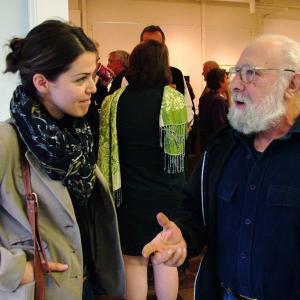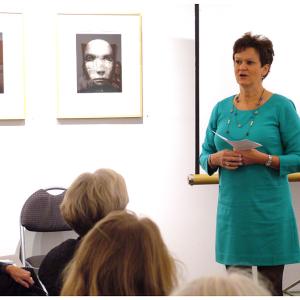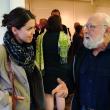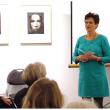Maine has the juice, needs political muscle
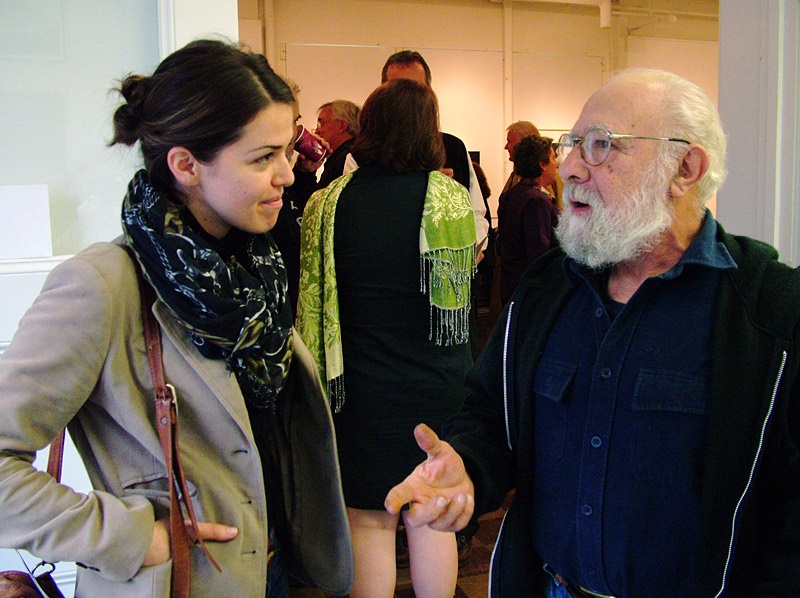 Generations of the creative economy: Artists Susan Dansereau and Joe Ascrizzi talk after a presentation by the Maine Arts Commission's new director Julie Richard at Waterfall Arts, Oct. 31. Dansereau moved to Belfast from Rhode Island in July. Ascrizzi, of Freedom, moved here from Connecticut in 1971. (Photo by Ethan Andrews)
Generations of the creative economy: Artists Susan Dansereau and Joe Ascrizzi talk after a presentation by the Maine Arts Commission's new director Julie Richard at Waterfall Arts, Oct. 31. Dansereau moved to Belfast from Rhode Island in July. Ascrizzi, of Freedom, moved here from Connecticut in 1971. (Photo by Ethan Andrews)
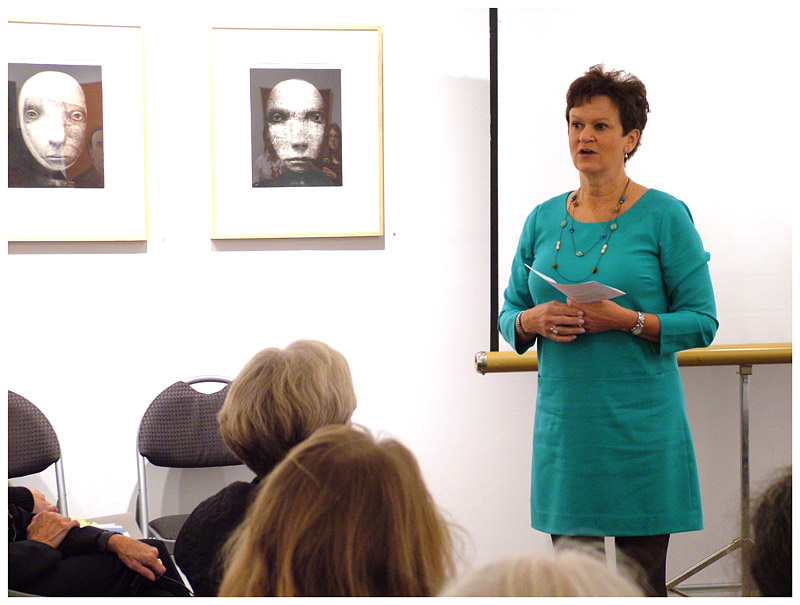 Julie Richard, newly appointed director of the Maine Art Commission in August, addresses a group of 60 people on the topic of the creative economy, at Waterfall Arts, Oct. 31. (Photo by Ethan Andrews)
Julie Richard, newly appointed director of the Maine Art Commission in August, addresses a group of 60 people on the topic of the creative economy, at Waterfall Arts, Oct. 31. (Photo by Ethan Andrews)
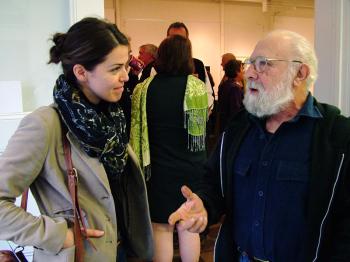 Generations of the creative economy: Artists Susan Dansereau and Joe Ascrizzi talk after a presentation by the Maine Arts Commission's new director Julie Richard at Waterfall Arts, Oct. 31. Dansereau moved to Belfast from Rhode Island in July. Ascrizzi, of Freedom, moved here from Connecticut in 1971. (Photo by Ethan Andrews)
Generations of the creative economy: Artists Susan Dansereau and Joe Ascrizzi talk after a presentation by the Maine Arts Commission's new director Julie Richard at Waterfall Arts, Oct. 31. Dansereau moved to Belfast from Rhode Island in July. Ascrizzi, of Freedom, moved here from Connecticut in 1971. (Photo by Ethan Andrews)
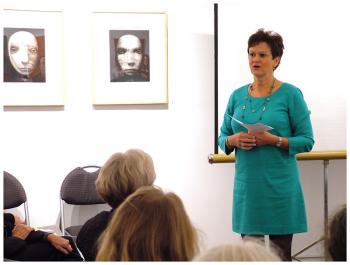 Julie Richard, newly appointed director of the Maine Art Commission in August, addresses a group of 60 people on the topic of the creative economy, at Waterfall Arts, Oct. 31. (Photo by Ethan Andrews)
Julie Richard, newly appointed director of the Maine Art Commission in August, addresses a group of 60 people on the topic of the creative economy, at Waterfall Arts, Oct. 31. (Photo by Ethan Andrews)
BELFAST - Maine is ahead of many states in terms of investing in its creative economy, according to Julie Richard, recently appointed director of the Maine Arts Commission. What the state's artists and arts organizations lack, she said, is a way to advocate for their collective interests.
"A lot of economic impact studies don't measure the economic impact of individual artists. And Maine ..." she said, pausing. " I can't even imagine the impact of individual artists."
Addressing a group of 60 artists, representatives from arts and economic development organizations, city officials and local residents at Waterfall Arts on Wednesday morning, Richard said Maine is ahead of many states in recognizing the value that arts impart to local economy.
The state is one of seven that has a central plan for developing the creative economy, one of nine to fund seed grants like the one that created the Belfast Creative Coalition earlier this year, and one of two with annual or semi-annual conventions, which focus on the creative economy (in Maine it’s the Juice Conference).
Richard, who moved from Arizona to Maine at the end of August to take the director position at MAC, said she found the awareness of the connection between arts and business here markedly different from what she experienced in Arizona.
“They just didn't get it,” she said. “They did not link tourism and the chambers and business leaders together to really sell the entire state of Arizona, and as a result they were almost zeroed out of the state budget, because the highly conservative state did not understand the value of the arts. They did not understand that arts drives business."
While Maine's arts-based economy is on the rise, Richard said artists and arts organizations need a way to advocate for themselves.
MAC is a focal point for arts activities in the state, but as a state agency, Richard said the commission can't advocate directly. A coalition of arts interests from outside of state government could also protect MAC from state budget cuts, she said.
Asked later what this advocacy might look like, Richard offered the example of a statewide e-mail network that could be used to spread the word on big issues to local arts leaders, who would, in turn, lobby their local representatives.
Former MAC Director Donna McNeil, who now serves as policy and program director, said communities around Maine are all facing the dilemma of what to do when mills and other large industries close down. The creative economy, she said, is a much wiser investment than some of the alternatives.
"What do you invest in? Do you bring in big boxes and smokestacks or do you invest in what's indigenous," she said.
McNeil defined "indigenous" as the local artists and creative groups and the resurgence of small farms in the region.
During a visit to the city last year, she said she saw poet laureate Jacob Fricke performing on the street, went to the Belfast Co-op and to a contradance. She likened the Belfast Free Range Music Festival to a fledgling version of the American Folk Festival in Bangor. All these things could be built upon, she said.
"That's what you have," she said. "Nobody wants those chicken factories to come back to Belfast. Nobody wants that kind of stench on the streets. They want a beautiful downtown with incredible tourism ... people who come to a city for arts and culture spend twice as much money and stay twice as long, so build on that."
After the talk, a number of people lingered and talked with friends and colleagues.
"I was excited to see Belfast in the spotlight," said Meg Fourier, co-founder of the Free Range Music Festival. "I love that things like the Free Range are possible. And it's because of the support we get in Belfast."
Martha Piscuskas, director of programming at Waterfall Arts, agreed with Richard's view that artists and arts organizations need to be able to collectively lobby state government. When Gov. LePage ordered the removal of a mural from the lobby of the Department of Labor last year, MAC couldn't do anything about it, she said.
"We need to advocate for ourselves," she said. "We can't rely on the Maine Arts Commission to be the sole statewide voice for the arts."
Kimberly Callas, coordinator for the Belfast Creative Coalition, said the community really benefits when a city supports the contributions it's creative organizations the way Belfast has.
"It can go unrecognized. It can go unmeasured, and here it is," she said, "the engine of this great economy."
Artist Joe Ascrizzi, who moved to Maine from Connecticut in 1971, traced the roots of Belfast's creative economy to the unstrategic desire of the back-to-the-landers of his generation.
"When I came up here, all my friends said, 'Why are you going up there? What about culture?'" he said. "What they didn't understand, and what I didn't even understand was we were the culture. We were the Lactobacillus that turned the milk into yogurt. And we didn't do it on purpose. We just couldn't help it."
Ascrizzi said each successive generation of artists took those ideas a little further.
"It took that long," he said, matter-of-factly. "It's like plants or anything natural. It takes that time."
Penobscot Bay Pilot reporter Ethan Andrews can be reached at ethanandrews@penbaypilot.com
Event Date
Address
256 High Street
Belfast, ME 04915
United States

